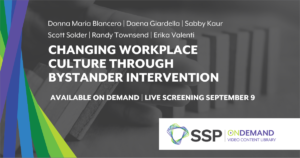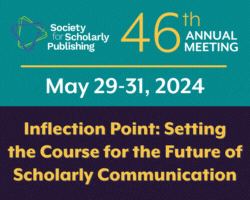Our debut series on the SSP OnDemand Library, the 2020 Professional Development Series, offers presentations on current trends and issues in scholarly communications—from the impact of COVID-19 to diversity, equity, and inclusion in publishing–available at your convenience. Free materials and paid sessions can be accessed individually or as part of a group; all recordings may be accessed as your schedule allows. Videos are offered on the following topics: Business Models and Strategies, Diversity, Equity, & Inclusion, Editorial Innovations, Ethics and Standards, Global Trends, Research Perspectives. Featuring panels of leaders in their respective fields, this series is a must for anyone wishing to keep abreast of the industry’s latest developments.
Bystanders play an important role in society—correcting inappropriate behaviors, making a positive change, but, most importantly, protecting the most vulnerable. In the workplace, these bystanders speak out against microaggressions and other injustices by colleagues. Eliminating a toxic environment takes an effective strategy starting from the top to stop transforming into a norm. Like any other industry, academic publishing is not immune to this challenge, but significant inclusivity and awareness are present for a permanent change.
Bystander intervention, what it means, how it works, and who it is for are all important questions within our scholarly publishing communities. This panel session aimed to inform and educate attendees on the purpose behind bystander intervention strategies and how they can cultivate safe and supportive workplace cultures. Sponsored by the SSP’s Diversity, Equity, and Inclusion Committee, it presented various voices on this topic to encourage honest and open discussion.
There is no question that it can be uncomfortable to intervene as a bystander, even becoming difficult. Scott Solder, Founder of the Active Bystander Training Company, states that our natural human instincts tell us to freeze during aggression as a survival trait. But if people become active when witnessing an injustice, they become part of a critical mass of intervention. Having active bystanders in the workplace is also essential for a business to perform successfully. When targeted employees suffer abuse, they experience mental and physical illnesses, impacting their performance.
For Donna Maria Blancero, Provost and Vice President of Academic Affairs at Bentley University, bystander intervention is her passion. In her academic years, she was experienced many microaggressions due to being a Latina woman. It has become her mission to let others know they are not alone and stop the aggressor(s).
One strategy discussed the speakers discussed is to be very direct and question inappropriate comments. It’s also helpful to provide information and give the speaker space to express what they meant.
To have a genuine commitment to making a difference in the workplace, everyone has to be active bystanders and call out deplorable acts. The video provided a clear message yet valuable offerings in how to sustain meaningful change in workplace culture. Bystander intervention enables diversity, equity, and inclusion, not only in our industry but in our communities.
Watch this session now or join us for a live screening with session speakers on October 21 at 11am.
News contribution by SSP member, Juan Fuentes. Juan is a Sales Manager with Accucoms.




Join the Conversation
You must be logged in to post a comment.